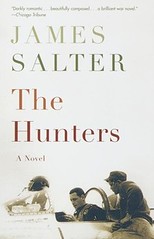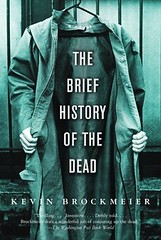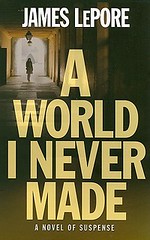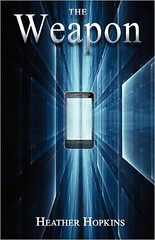“Friends on the outside were always asking why he stayed in […] he had tried to find an answer sitting alone at dinner in the club filled with administrative majors and mothers talking about their children, but he never could. In his mind he carried Saturdays of flying, with the autumnal roar of crowds on the radio compass and the important stadiums thirty minutes apart and button-small, the wingmen like metallic arrows poised in the air above a continent, the last sunlight slanting through the ground haze, and cities of concrete moss; but never any reasonable reply. Or, sick of the stars and bored with speed on those nights in the great black sea, the surf of which was cities bubbling on the wave, listening to the others who were up, two unseen killers perhaps, calling themselves Butcher Red and seeking themselves in the darkness, he had tried to think of one—brief, understandable—but never could. It was a secret life, lived alone.” —James Salter, The Hunters
 The Hunters
The Hunters
James Salter
![]()
The prose is spare and clear, the characters vivid and real. The sights and sounds of daily life in an operational fighter squadron, the sense and feel of flying and aerial combat, are as authentic as anything I’ve read, and could only have been written by someone who had been there.
I flew F-15s from the late 1970s to the mid-1990s; though my fighter was far more advanced than the F-86s Salter flew during the Korean War I was pleased to learn how little the basic experience has changed. Salter nails the essential experience of war in the air: you may be leading a four-ship with three other pilots on your wing, you may be in the midst of a turning dogfight with MiGs, but in your cockpit you are always insulated and alone … the fighter pilot’s war is secret and solitary.
When Salter’s character Cleve Connell begins to obsess over kills … the inevitable scoring of MiGs downed and damaged, the consequent favoring of pilots within a squadron … thoughts on the morality of war and the reasons for fighting go out the window. In my experience, this is dead on: it’s what every fighter pilot lives for. When Salter describes Pell, the wingman who time and again abandons his lead to go after kills in a rush to make ace, I recognized the type immediately and felt an old familiar chill. Yes, there are pilots like that … just exactly like that … in every squadron. Fortunately they are rare.
Some compare Salter’s writing to Hemingway’s, but I think it’s more accurate to say that while Hemingway would have written it differently, it’s Hemingway’s kind of story, elemental and true.
 The Brief History of the Dead
The Brief History of the Dead
Kevin Brockmeier
![]()
I find this one impossible to review without telling you something about the story, so consider yourself warned.
I’m not a great fan of fantasy or books about ghosts, but this one was said to be Gaimanesque, and since I actually like the one or two Gaiman fantasies I’ve read, I gave it a try. The Brief History of the Dead is about, as you’d expect, the dead. So it should consist of blank pages, right? No, in Brockmeier’s fantasy, the dead enter a lifelike holding pattern, living in their own bodies (still corporeal, eating and defecating, sleeping and waking, generally carrying on with the jobs they did in life) in a city which expands and contracts as the population of the dead waxes and wanes. The dead don’t know why they’re there, or why some of them mysteriously vanish; their belief is that they stay in the city as long as living people back in the world remember them, that when they are forgotten in the real world, they go … somewhere else? Nowhere?
It’s a charming idea, but it begs more follow-through than Brockmeier brings to the task. A city of the dead would be teeming with people of all races and nationalities, but he mentions only one deader who doesn’t speak English. A blind man continues to be blind after death, but other deaders, who perished of wasting diseases or were crushed in car crashes, have well-functioning bodies.
My favorite parts of the book were the chapters about a living woman, Laura Byrd, who finds herself abandoned in an Antarctic research station and gradually comes to believe she’s the last living person, the sole survivor of a global pandemic. These chapters are more science fiction than fantasy, and since I’m a huge sci-fi fan they pulled me along.
A very enjoyable read, even if the what-happens-when-you’re-dead story line isn’t one I’d normally go out of my way to read. If I happen upon another novel by Kevin Brockmeier I’ll probably give it a try.
 What It Was
What It Was
George Pelecanos
![]()
Retro crime novel set in 1970s Washington DC, populated by black criminals and hookers. There’s a black private dick and a white cop who works the black side of the street. Think Isaac Hayes and Shaft and you’ve pretty much got what Pelecanos is going for here.
Is it enough, when trying to capture a time & place, to simply catalog the music, movies, clothing, and automobiles of the era? Pelecanos seems to think so. Nearly every short chapter opens with one of the characters putting an eight-track into the player and blasting out Martha and the Vandellas as he or she shifts into drive. Nearly every short chapter has another recording in the middle, yet another at the end. Oh, and Pelecanos lingers over the boobs of every black female character in his book, which rather dates him, I think.
Also … did anyone ever, at any time, describe shooting a man as “leading” him?
Don’t get me wrong, the story was interesting enough to pull me along, but Pelecanos’ writerly tricks struck me as lazy, shallow, and repetitive. Overall, What It Was elicited a lukewarm meh.
 A World I Never Made
A World I Never Made
James LePore
![]()
I felt I’d read this novel before, or at least parts of it, but maybe it’s more accurate to say “seen” instead of “read,” because it reads like a B-movie screenplay. It’s an international thriller with Gypsies, which is the one element that keeps it from being totally generic. It’s readable, and I did finish it, but my sense of frustration was high throughout, fueled by ridiculous numbers of typos. I’ve complained about poor ebook editing before; apparently to deaf ears. If you can get past missing apostrophes and misplaced quotation marks, you’ll find this novel readable as an “airport book.” But if you’re looking for something original, look elsewhere. Overall, a disappointment.
And at the risk of repeating myself: typos galore! There were times I wanted throw my Nook across the room in disgust, but then I’d remind myself it wasn’t the Nook’s fault … the blame lies strictly with the publisher, The Story Plant. Do I have to start checking the names of publishing houses before ordering and downloading any more ebooks? Because I will, Story Plant, I will.
 A Dance with Dragons (A Song of Fire and Ice #5)
A Dance with Dragons (A Song of Fire and Ice #5)
George R.R. Martin
![]()
Whatever will I do now? I’ve finished every book in the Song of Ice and Fire series. I’ve watched every episode of Game of Thrones on TV. The story is unfinished; it may never be.
Warning: one cannot discuss this or any of the Game of Thrones books without some spoilage. But I will try to keep it to the most general level so as not to reveal any character surprises.
As promised at the end of book #4, A Feast for Crows, GRRM here brings us back to the characters left hanging at the end of book #3, A Storm of Swords. We catch up with Tyrion, Jon Snow, Bran Stark, and Daenyres. We meet the dragons again. And, once we have caught up with the timeline of book #4, Cersei appears once more. Missing entirely? Littlefinger (why do I keep wanting to call him “Newman”?) and Lady Sansa. Once again, a character we have pinned many hopes on dies. Winter, the threat that has hovered over the land since the opening pages of the first book, finally arrives, literally in the last pages of this last (for now) book.
Vis-à-vis Westeros, the Wall, and the Free Cities, nothing much happens. GRRM is still in the leadup phase. But if I have learned one thing, it is that when something does happen … should book #6 ever be written … it will not be what you or I were hoping for. Perhaps, then, should GRRM never finish the tale, this is as good a place as any to end.
Perusing Goodreads reviews, I see that many readers are disappointed in books #4 & #5, accusing GRRM of drifting away from what he had started in books #1 through #3. I was a little disappointed in book #4, but only because it skipped over main characters to focus on secondary ones. This book more than scratched the main character itch and I was once again fully engaged, hanging on every page. I don’t think GRRM has drifted away from anything … his story, granted, is complex, chaotic, confusing, and morally ambiguous … but it reflects life, where nothing ever gets tied up in a neat bow and happy endings are the exception that proves the rule.
Yes, I want more, but if no more is forthcoming, I’ll be satisfied with what has been a grand experience. I’m not likely to forget these books, ever.
 The Weapon
The Weapon
Heather Hopkins
![]()
I received this book, signed by the author, as a Goodreads promotion. It sat on my to-read shelf for months, but now I’ve finally read it. It is, as billed, an international thriller … a fast read, filled with action, something you’d read to pass the time on a long flight.
It could be better than it is. I found the the weapon of the title less than credible. The beautiful and intelligent heroine, Veronica Stone, is the only character with any depth; everyone else is a foil. The plot contained internal inconsistencies and non-sequiturs. Occasionally, as with the out-of-nowhere introduction of Veronica’s equally beautiful and intelligent Harvard classmate Mary, deus ex machina interventions were required to keep the heroine one step ahead of death and destruction.
There probably should be more smart women protagonists in international thrillers, and why not have them be beauties as well? Heather Hopkins is on to something here. I wish she didn’t resort to Donald Trumpish codifications for wealth and power, though; over and over again, Veronica is described as a player in the world of CEOs, as if CEOs … a shallow and selfish lot IMHO … are worthy of emulation.
But by golly, there’s plenty of action, and the pages seemed to turn themselves.